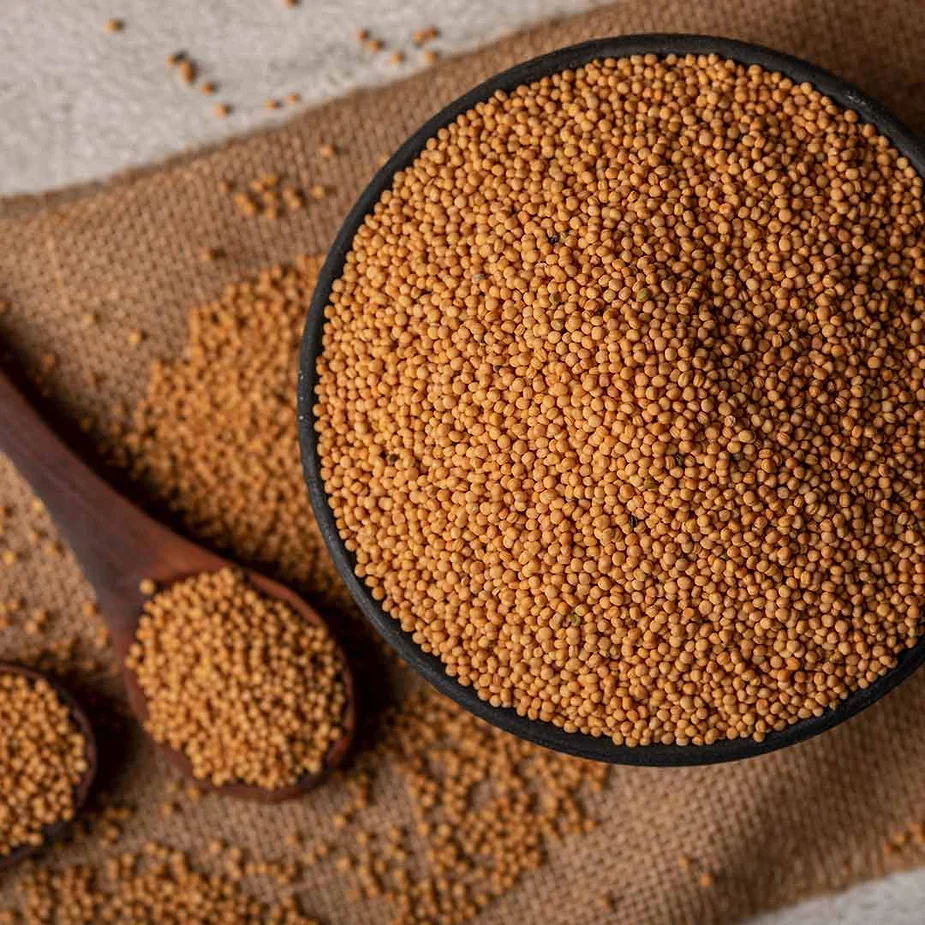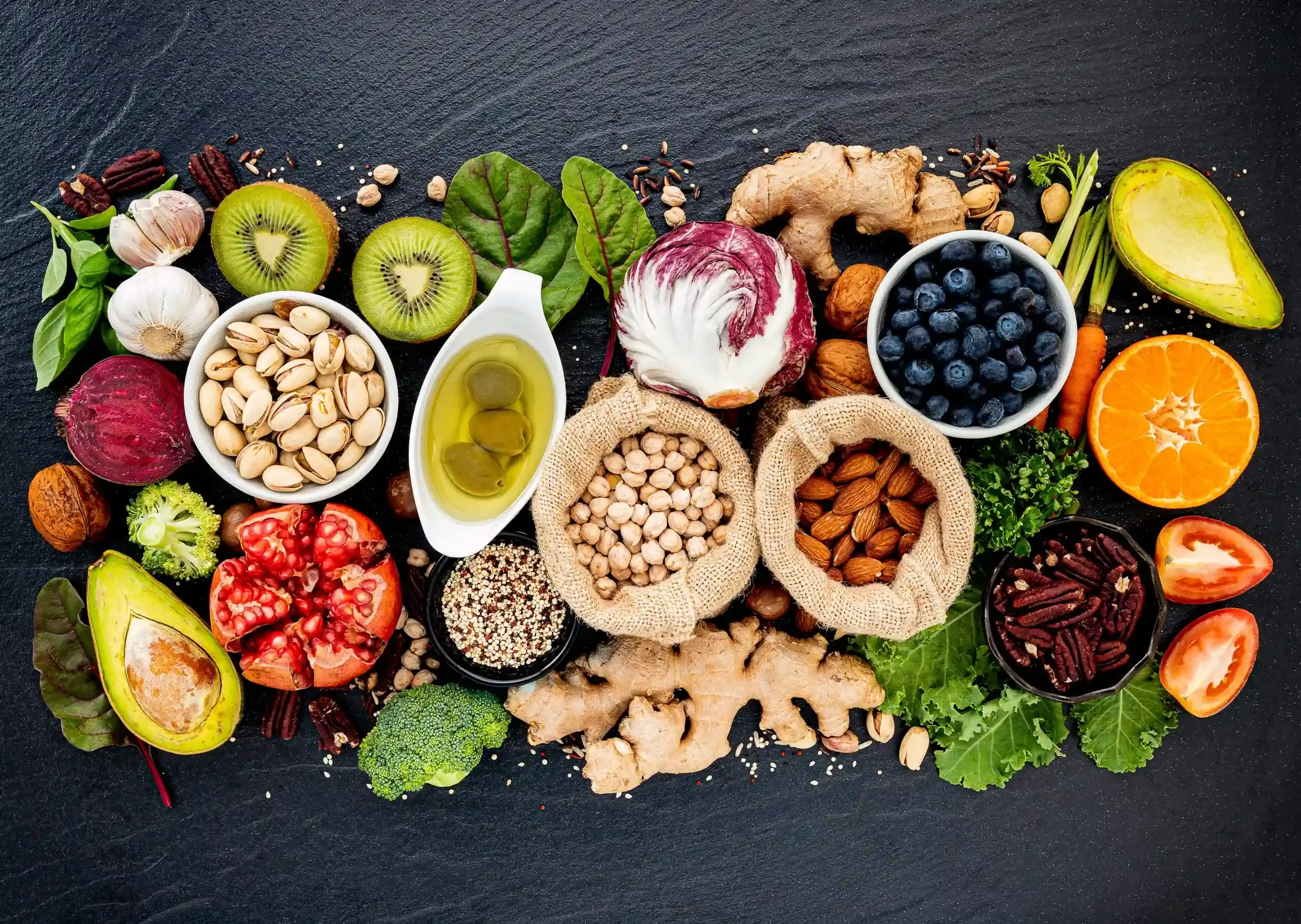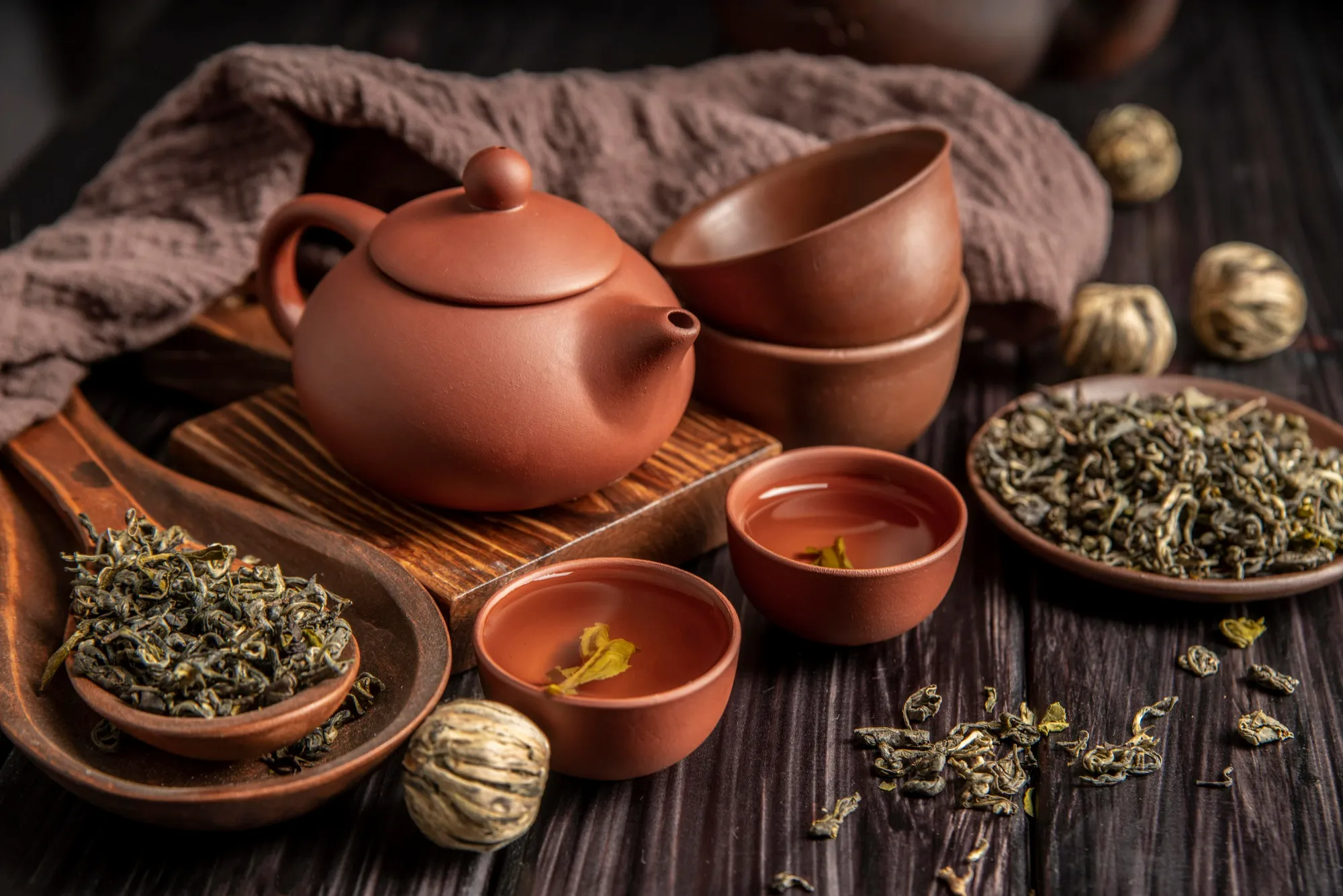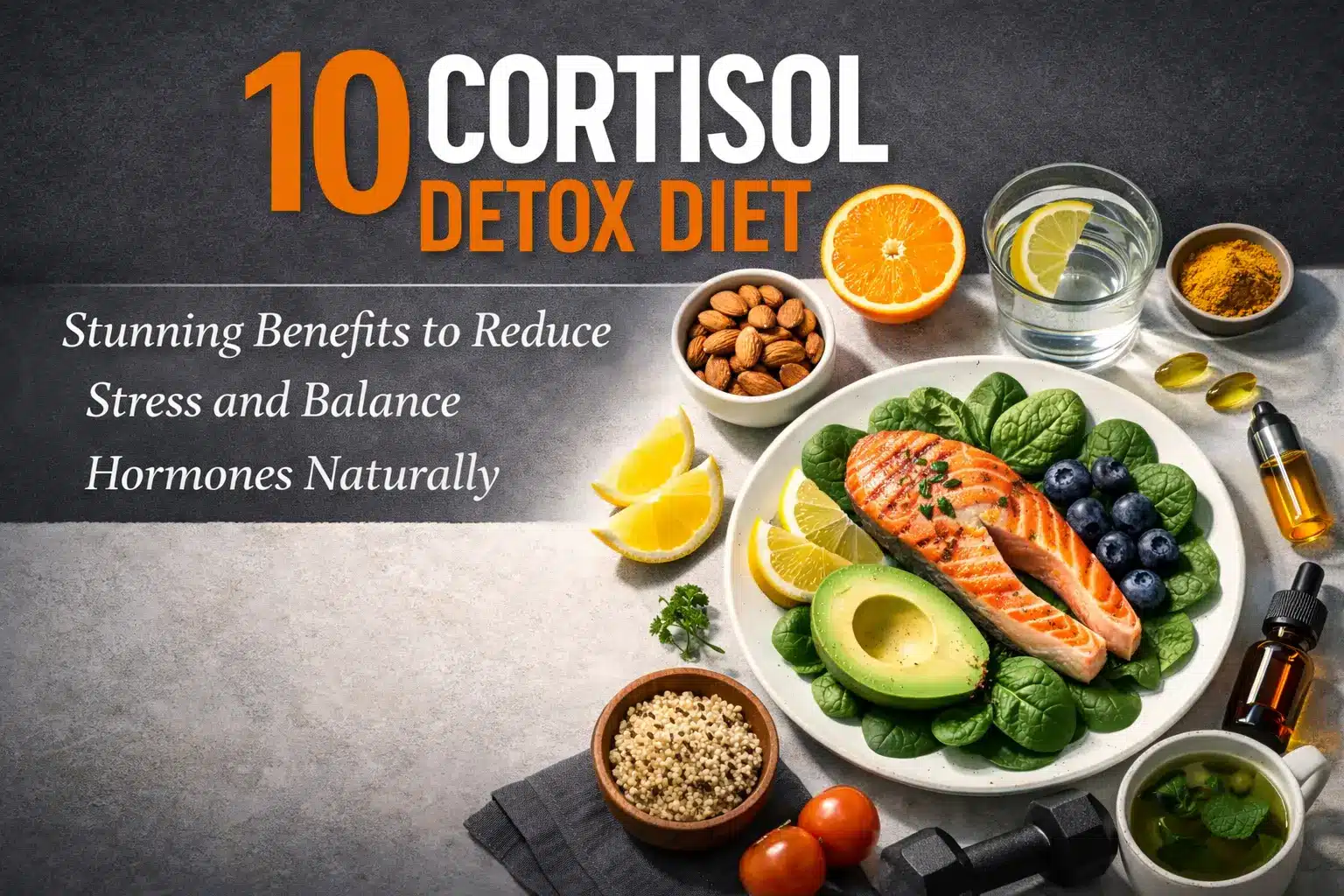- What is Mustard
- Mustard Nutrition Facts
- 26 Mustard Seeds Benefits
- 1-Mustard Benefits for Athletes
- 2-Improve Digestive System
- 3-Heart Health
- 4-Blood Sugar Management
- 5-Anti-inflammatory Potential
- 6-Good For Respiratory System
- 7-Rich in Antioxidants
- 8-Low-Calorie Condiment
- 9-Rich in Nutrients
- 10-Supports Bone Health
- 11-Potential Cancer-Preventive Properties
- 12-Aids in Muscle Recovery
- 13-Boosts Immune System
- 14-Improves Skin Health
- 15-May Aid in Weight Loss
- 16-Anti-Bacterial and Anti-Fungal
- 17-Detoxification
- 18-Potential Appetite Suppressant
- 19-Helps Manage Menopausal Symptoms
- 20-Natural Pain Relief
- 21-Improves Hair Health
- 22-Eye Health
- 23-Supports Liver Function
- 24-Encourages Healthy Metabolism
- 25-Improves Cognitive Function
- 26-Natural Remedy for Colds and Flu
- Additional Tips
- Mustard Seed Uses: Creative and Healthy Culinary Applications
- Conclusion
Mustard isn’t just a flavorful condiment; it’s a nutritional powerhouse with potential health benefits. The simple question, “Is mustard good for you?”, has a resounding answer: Yes! Made from nutrient-rich crushed seeds, mustard comes in various types, each offering unique flavors and various health perks. From supporting digestion to providing antioxidant properties, mustard is more than just a zesty spread—it’s a valuable addition to a healthy diet. Dive in to discover why this centuries-old condiment deserves a place in your pantry.
From the classic yellow mustard gracing your backyard barbecues to its robust brown type favored by chefs, mustard offers a spectrum of tastes and potentials waiting to be explored. More importantly, the advantages of these tiny seeds are countless.
What is Mustard
Mustard is a versatile condiment made from the seeds of the mustard plant, which belongs to the Brassica family, along with broccoli and cabbage. The seeds are crushed and mixed with liquids like water, or vinegar creating a paste or sauce that varies in flavor from mild to spicy.
For those who are searching Google “is mustard healthy”, the answer is Yes, mustard is healthy. It’s low in calories, contains beneficial nutrients like antioxidants, and may support digestion and heart health. This simple yet powerful condiment has been used for centuries, not only to enhance the taste of food but also for its potential health benefits, making it a staple in kitchens around the world.
Mustard Nutrition Facts
Mustard nutrition facts can also vary depending on the type you choose. Moreover, understanding mustard calories is key for those mindful of their calorie intake, as it offers a flavorful way to enhance dishes without adding significant calories. The flavor profile of this unique seed may be diverse. Let’s embark on a journey through the most common mustard seed varieties, exploring their unique nutrient compositions.
Yellow Mustard Seeds
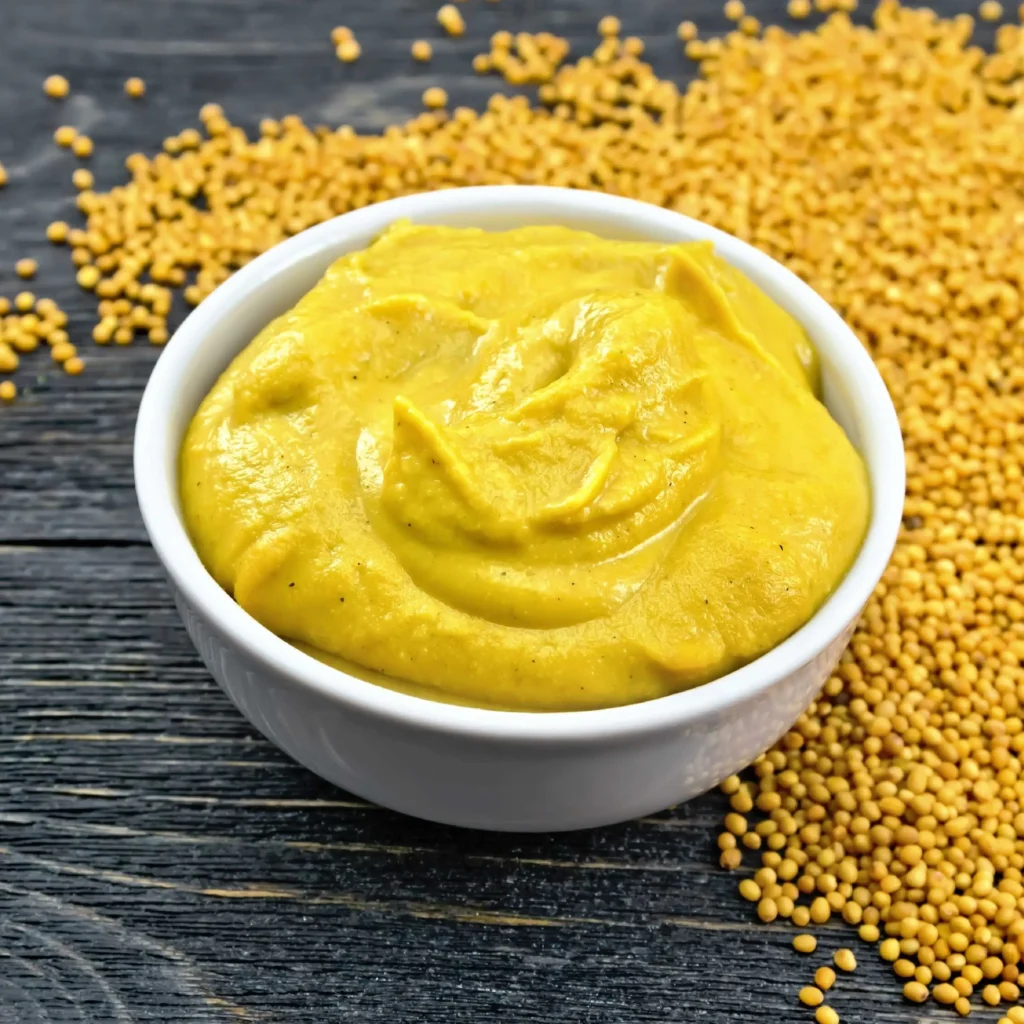
Undeniably, yellow mustard seeds reign supreme in American kitchens. Instantly recognizable by its vibrant yellow hue, thanks to the addition of turmeric, this widely popular variety boasts a smooth texture and a mild flavor profile. These characteristics, along with its versatility, make it a favorite for everyday use.
- Flavor: Mild and tangy
- Ingredients: Yellow seeds, vinegar, water, salt, and turmeric (which gives it the bright yellow color)
- Uses: Popular on sandwiches, hot dogs, and as a base for salad dressings and marinades.
Nutritional Value 1 tablespoon (approximately 15 grams)
- Calories: 9
- Fat: 0.5g
- Saturated Fat: 0g
- Carbohydrates: 0.5g
- Sugars: 0g
- Protein: 0.5g
- Fiber: 0g
- Sodium: 55mg
Whole Grain Mustard
In contrast to the smooth texture of yellow mustard, Brown Mustard is crafted from whole or partially ground mustard seeds, resulting in a coarse texture with visible seeds. Whole grain mustard is healthy, as it retains more of the mustard seed’s natural fiber and nutrients, making it a wholesome choice for adding texture and flavor to your meals. A popular choice in many European cuisines, brown mustard is often used to elevate the depth and texture of dishes.
- Flavor: Tangy and slightly spicy with a robust texture
- Ingredients: Whole seeds (often brown or black), vinegar, water, and salt
- Uses: Great for adding texture to dishes, as a spread on meats, and in salad dressings and sauces.
Nutritional Value
- Calories: 20
- Fat: 1g
- Saturated Fat: 0.1g
- Carbohydrates: 1g
- Sugars: 0g
- Protein: 1g
- Fiber: 1g
- Sodium: 180mg
Spicy Brown Or Deli Mustard
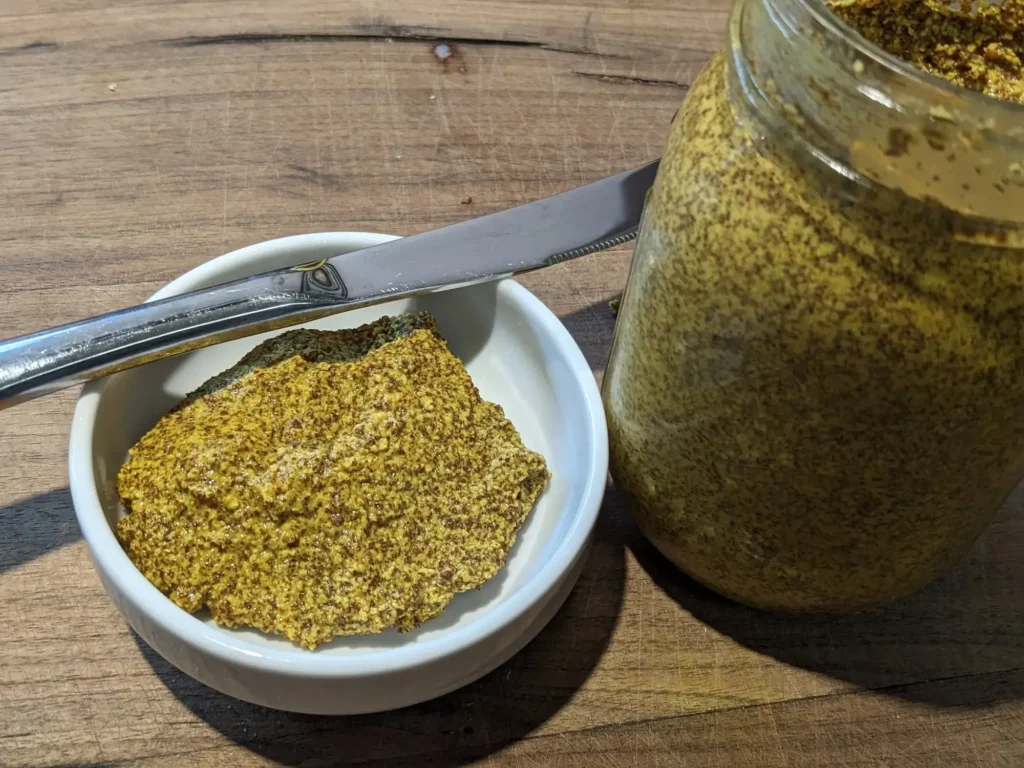
This is a coarser and spicier version of the yellow variant. It is made with brown seeds and is less finely ground, giving it a robust flavor and a hearty texture.
- Flavor: Coarse, robust, and spicy
- Ingredients: Brown seeds, vinegar, water, salt, and sometimes turmeric
- Uses: Commonly used on deli sandwiches, with sausages, and in robust marinades and sauces.
Nutritional Value 1 tablespoon (approximately 15 grams)
- Calories: 10
- Fat: 0.5g
- Saturated Fat: 0g
- Carbohydrates: 1g
- Sugars: 0g
- Protein: 0.5g
- Fiber: 0g
- Sodium: 120mg
English Mustard
Moving on to a bolder option, English mustard packs a punch with its intense heat and sharp flavor. Traditionally made with a blend of yellow and brown mustard seeds, this condiment delivers a strong, pungent taste that adds a delightful spicy kick to meats and savory dishes in British cuisine.
- Flavor: Very hot and pungent
- Ingredients: A mix of yellow and brown seeds, flour, and turmeric
- Uses: Traditional accompaniment to roast beef and other meats, as well as in various British recipes.
Nutritional Value 1 tablespoon (approximately 15 grams):
- Calories: 15
- Fat: 0.8g
- Saturated Fat: 0.1g
- Carbohydrates: 0.8g
- Sugars: 0.1g
- Protein: 0.8g
- Fiber: 0.4g
- Sodium: 125mg
Honey Mustard
In contrast to the bold flavors of brown and English mustards, honey mustard is healthy and offers a delightful sweet and tangy twist. This popular variation combines the characteristic spiciness of mustard seeds with the sweetness of honey, resulting in a smooth and creamy texture. This unique flavor profile makes honey mustard a versatile favorite for dressings, dips, and glazes. It’s especially loved for its ability to balance savory dishes with a touch of sweetness.
- Flavor: Sweet and tangy
- Ingredients: A blend of Yellow Variant and Honey, sometimes with added vinegar and spices
- Uses: Ideal for salad dressings, dipping sauces, and as a glaze for meats.
Nutritional Value
- Calories: 45
- Fat: 0.3g
- Saturated Fat: 0g
- Carbohydrates: 11g
- Sugars: 9g
- Protein: 0.3g
- Fiber: 0.2g
- Sodium: 135mg
German Mustard
Unlike the previously mentioned varieties, Deli Mustard boasts a wide range in flavor profiles depending on the region. Some types are known for their sweet and mild character, while others pack a hot and spicy punch. This versatility often stems from a mix of mustard seeds used in its production, resulting in a complex flavor profile. An essential condiment in German cuisine, Deli Mustard pairs perfectly with traditional foods like sausages and pretzels.
- Flavor: Can range from mild and sweet to hot and spicy
- Ingredients: Varies by region, and often includes a mix of seeds, vinegar, and a variety of spices
- Uses: Commonly paired with sausages, pretzels, and other traditional German dishes.
Nutritional Value
- Calories: 15
- Fat: 1g
- Saturated Fat: 0.1g
- Carbohydrates: 1g
- Sugars: 0.1g
- Protein: 1g
- Fiber: 0.5g
- Sodium: 120mg
Hot Mustard (Chinese Mustard)
Also known as Chinese mustard, this condiment is renowned for its sharp and intense heat. The secret to its kick lies in the preparation method. Mixing the mustard powder with water activates the natural enzymes in the seeds, releasing the powerful heat we all know and love. A staple in Chinese cuisine, Hot Mustard is often served as a dipping sauce, adding a powerful kick to appetizers and various dishes.
- Flavor: Very hot and sharp
- Ingredients: Ground brown or black mustard seeds mixed with water (sometimes vinegar)
- Uses: Popular in Chinese cuisine, often served as a condiment with egg rolls, dumplings, and other appetizers.
Nutritional Value
- Calories: 15
- Fat: 0.5g
- Saturated Fat: 0g
- Carbohydrates: 1g
- Sugars: 0g
- Protein: 0.5g
- Fiber: 0.5g
26 Mustard Seeds Benefits
Mustard isn’t just a flavor bomb; it might be a hidden gem in the world of health-supportive condiments! Indeed, while research is ongoing to fully understand its properties, studies suggest that consumption of this dynamic seed might offer a range of potential benefits for your well-being. For instance, let’s explore some of the most promising areas.
1-Mustard Benefits for Athletes
Athletes and fitness enthusiasts frequently ask, “Is mustard good for you?” Absolutely! Mustard is a low-calorie condiment that provides essential nutrients and antioxidants, which can support muscle recovery and reduce inflammation. Rich in minerals like magnesium and selenium, mustard can help boost endurance and overall performance. Its natural compounds may also aid digestion, making it a smart, flavorful addition to a balanced diet for those serious about their fitness goals.
2-Improve Digestive System
Mustard seeds are a good source of fiber, which plays a crucial role in digestion. Fiber helps regulate bowel movements, promotes gut health, and can contribute to feelings of fullness.
Additionally, some studies suggest that certain compounds in mustard, like allyl isothiocyanate (AITC), may have digestive enzyme-stimulating properties.
3-Heart Health
“Does mustard lower blood pressure?”. The answer is Yes. Research has explored that mustard oil can positively impact the plasma lipid profile and reduce total cholesterol, and non-HDL cholesterol levels while increasing HDL cholesterol. The presence of omega-3 fatty acids also supports cardiovascular health, reducing the risk of heart disease.
4-Blood Sugar Management
Mustard consumption may have a positive impact on blood sugar management. This is particularly interesting for those managing diabetes or prediabetes. The potential mechanism behind this benefit might be related to compounds in it that can help regulate blood sugar levels after a meal.
5-Anti-inflammatory Potential
Chronic inflammation is linked to various health concerns. The allyl isothiocyanate (AITC) found in these seeds possesses potential anti-inflammatory properties. Mustard consumption might offer some support in managing inflammation.
6-Good For Respiratory System
Studies suggest that mustard seeds might offer some relief from respiratory issues like congestion. This potential benefit may be due to the decongestant properties of certain mustard seed compounds.
7-Rich in Antioxidants
Mustard seeds contain a variety of antioxidants, including isothiocyanates, which help combat oxidative stress and reduce the risk of chronic diseases such as cancer and heart disease.
8-Low-Calorie Condiment
With just about 3 calories per teaspoon, mustard is a great way to add flavor to meals without adding significant calories. This makes it an excellent choice for those looking to manage their weight while still enjoying tasty food.
9-Rich in Nutrients
Mustard seeds are packed with essential vitamins and minerals, including vitamins A, C, and K, as well as calcium, magnesium, potassium, and selenium. These nutrients are vital for maintaining overall health, supporting bone health, immune function, and more.
10-Supports Bone Health
The calcium, magnesium, and phosphorus in mustard contribute to strong bones and may help prevent osteoporosis. These minerals are essential for maintaining bone density and overall skeletal health.
11-Potential Cancer-Preventive Properties
Mustard seeds contain glucosinolates, which are converted into isothiocyanates when crushed. Isothiocyanates have been shown in studies to have cancer-preventive properties, particularly against cancers of the digestive tract.
12-Aids in Muscle Recovery
For athletes and those who engage in regular physical activity, the nutrients in mustard, particularly magnesium and potassium, can aid in muscle recovery and reduce the risk of cramps.
13-Boosts Immune System
The high content of vitamins A and C in mustard seeds can help strengthen the immune system, protecting the body against common illnesses and infections.
14-Improves Skin Health
Mustard’s antioxidant and anti-inflammatory properties can also benefit the skin. It may help reduce signs of aging, such as wrinkles and fine lines, and improve the overall texture and tone of the skin.
15-May Aid in Weight Loss
Mustard’s low-calorie content combined with its metabolism-boosting properties can assist in weight loss efforts. It can be used to add flavor to foods without the need for high-calorie dressings or sauces.
16-Anti-Bacterial and Anti-Fungal
Mustard seeds have been shown to have anti-bacterial and anti-fungal properties, which can help protect against infections.
17-Detoxification
Mustard may help in the detoxification process by promoting the elimination of toxins from the body. The antioxidants in mustard help neutralize harmful free radicals, aiding in the body’s natural detox processes.
18-Potential Appetite Suppressant
Some research suggests that mustard may have appetite-suppressing qualities, helping to control hunger and reduce overall calorie intake.
19-Helps Manage Menopausal Symptoms
The magnesium content in mustard may help alleviate symptoms associated with menopause, such as mood swings, sleep disturbances, and hot flashes.
20-Natural Pain Relief
Mustard oil has been traditionally used for massages to relieve pain and discomfort from conditions like arthritis, muscle strains, and joint pains.
21-Improves Hair Health
Mustard oil is also used for hair care, as it is believed to strengthen hair, reduce dandruff, and promote healthy hair growth.
22-Eye Health
The presence of vitamin A in mustard contributes to maintaining good eye health and may help prevent age-related macular degeneration.
23-Supports Liver Function
Mustard may aid in liver function by enhancing the body’s ability to detoxify harmful substances, thanks to its antioxidant content.
24-Encourages Healthy Metabolism
The nutrients in mustard seeds can help support a healthy metabolism, contributing to better energy levels and overall health.
25-Improves Cognitive Function
Some studies suggest that the omega-3 fatty acids and selenium in mustard may support brain health and cognitive function, potentially reducing the risk of neurodegenerative diseases.
26-Natural Remedy for Colds and Flu
Mustard is often used in natural remedies for colds and flu, due to its warming properties, which can help relieve congestion and soothe sore throats.
However, it’s important to consult with a healthcare professional before significantly increasing your mustard intake, especially if you have any underlying health conditions or are taking medications.
Additional Tips
Here are some tips to enjoy its benefits while keeping potential downsides in mind:
- Read Labels Carefully: Pay attention to the sodium content when choosing mustard varieties. Opt for low-sodium or sodium-free options whenever possible.
- Start Slow: If you’re new to using this, begin with a small amount and gradually increase your intake as tolerated. This allows your body to adjust and helps identify any potential sensitivities.
- Explore Variety: This seed offers a spectrum of flavors. Experiment with different types to find ones that suit your taste preferences and potentially offer specific health benefits (e.g., brown mustard for anti-inflammatory support).
- Portion Control is Key: Even healthy foods can be enjoyed in excess. Use mustard strategically to enhance flavor, but be mindful of portion sizes.
Mustard Seed Uses: Creative and Healthy Culinary Applications
Move over, hot dog! Mustard’s potential extends far beyond its role as a simple condiment. This versatile ingredient can be a flavor powerhouse in your kitchen, adding depth and health benefits to a wide range of dishes. Whether you’re seeking new ways to boost flavor or looking for healthy alternatives, here are some mustard seed uses to elevate your culinary creations:
1-Mustard as a Marinade Masterpiece
Mustard’s natural enzymes make it an excellent tenderizer, infusing meats with flavor while keeping them juicy. Create a marinade by mixing Dijon mustard with olive oil, garlic, and fresh herbs. This combination works wonders on chicken, fish, or tofu, offering a zesty flavor while promoting heart health with its rich omega-3 fatty acids.
2-Healthy Homemade Salad Dressings
Why settle for store-bought dressings when you can create a healthy salad dressing at home? Dijon mustard is a perfect base for a tangy vinaigrette. Blend it with extra virgin olive oil, lemon juice, honey, and garlic for a flavorful, heart-healthy option. For a creamier twist, mix whole grain mustard with Greek yogurt and fresh herbs to keep your salads both nutritious and delicious.
3-Flavorful Dips with a Healthy Twist
Elevate your snack game with mustard-based dips that are both tasty and good for you. A simple dip made with whole grain mustard and Greek yogurt can transform a veggie platter into a nutritious delight. Add fresh dill and a squeeze of lemon for a refreshing, tangy dip that pairs perfectly with whole-wheat pita or raw vegetables.
4-Savory Sauces that Pack a Punch
Mustard can be the secret ingredient in sauces that enhance your meals. For a quick and rich sauce, deglaze a pan with white wine, whisk in Dijon mustard, and add a splash of heavy cream. This creamy sauce is perfect for drizzling over chicken or vegetables, offering both flavor and a dose of antioxidants.
5-Soup with a Mustard Kick
Surprise your taste buds by adding mustard to creamy soups. Stirring a teaspoon of Dijon mustard into a bowl of potato or broccoli cheddar soup can provide a subtle, tangy flavor that complements the creaminess. Not only does it enhance the taste, but it also brings added nutrients like selenium and magnesium.
6-Beyond the Kitchen: Mustard’s Versatile Uses
Mustard isn’t just for food! Brown mustard seeds have potential antibacterial properties, making them useful in natural cleaning solutions. Mix a small amount with water to create a natural cleaner, but remember to test it on an inconspicuous area first.
Conclusion
Mustard offers a variety of flavors and textures, catering to different palates and culinary applications. Moreover, beyond its iconic yellow hue, mustard boasts a diverse range of types, each with its potential health benefits. Furthermore, it generally packs a low-calorie and fat-free punch, making it a guilt-free condiment choice for health-conscious individuals. Additionally, research suggests that mustard consumption might play a role in promoting digestion, heart health, and blood sugar management, and potentially even offer anti-inflammatory and respiratory support.

